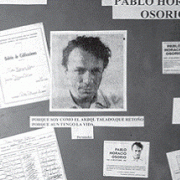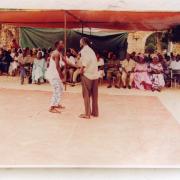French Collection of Tactics (book)
 This book, published by the Center for Victims of Torture - New Tactics in Human Rights, is a collection of 80 stories of successful tactics used for human rights work. The stories come from all over the world and range from prevention tactics to intervention tactics, restorative tactics to those that building human rights cultures and institutions.
This book, published by the Center for Victims of Torture - New Tactics in Human Rights, is a collection of 80 stories of successful tactics used for human rights work. The stories come from all over the world and range from prevention tactics to intervention tactics, restorative tactics to those that building human rights cultures and institutions.


 Documentary Heritage is a program of Memoria Abierta (Open Memory), whose goal is to improve the use of and access to the documentation stored in the institutional archives of participating human rights organizations. The Documentary Heritage Program seeks to make all of the documentation related to the period of state terrorism and its present consequences accessible for research and educational purposes, thereby increasing knowledge and contributing to a social conscience about what occurred in Argentina.
Documentary Heritage is a program of Memoria Abierta (Open Memory), whose goal is to improve the use of and access to the documentation stored in the institutional archives of participating human rights organizations. The Documentary Heritage Program seeks to make all of the documentation related to the period of state terrorism and its present consequences accessible for research and educational purposes, thereby increasing knowledge and contributing to a social conscience about what occurred in Argentina.  Citizens’ Watch, a Russian nongovernmental organization, uses a collaborative tactic to engage governmental officials, who in many cases are seen as the adversary and not considered as partners. Citizens’ Watch recognized the potential for engaging bureaucrats who illustrated a level of interest in significantly advancing human rights. The author describes the unique uses of this tactic and highlights examples of cross-sectoral cooperation between a nongovernmental organization and the Russian government to advance human rights.
Citizens’ Watch, a Russian nongovernmental organization, uses a collaborative tactic to engage governmental officials, who in many cases are seen as the adversary and not considered as partners. Citizens’ Watch recognized the potential for engaging bureaucrats who illustrated a level of interest in significantly advancing human rights. The author describes the unique uses of this tactic and highlights examples of cross-sectoral cooperation between a nongovernmental organization and the Russian government to advance human rights.  Oulimata Gaye and her organization Réseau Africain pour le Développement Intégré (RADI) break the wall of silence that cloaks violence against women in Senegal. How do we begin to “repair” human rights problems when people will not speak of them? How do we make people talk about them? The tool used here is theater. At times amusing, at times sad, the sketches involve the audience, literally and metaphorically, in familiar situations.
Oulimata Gaye and her organization Réseau Africain pour le Développement Intégré (RADI) break the wall of silence that cloaks violence against women in Senegal. How do we begin to “repair” human rights problems when people will not speak of them? How do we make people talk about them? The tool used here is theater. At times amusing, at times sad, the sketches involve the audience, literally and metaphorically, in familiar situations.  The Center for Victims of Torture (CVT) has instituted an intensive training and supervision model for refugees to develop local capacity for providing understanding and skills for mental health support to rebuild communities after massive human rights atrocities. CVT has instituted the training model in refugee camps in Guinea and Sierra Leone for refugees from Sierra Leone and Liberia. The model combines intensive, hands-on training of refugees with ongoing supervision.
The Center for Victims of Torture (CVT) has instituted an intensive training and supervision model for refugees to develop local capacity for providing understanding and skills for mental health support to rebuild communities after massive human rights atrocities. CVT has instituted the training model in refugee camps in Guinea and Sierra Leone for refugees from Sierra Leone and Liberia. The model combines intensive, hands-on training of refugees with ongoing supervision.  Trokosi, in Ghana, is a system of servitude that meets the community need for justice and the material and sexual needs of fetish priests. Customary or traditional practices based on deep-seated beliefs, such as Trokosi, are often the more difficult human rights violations to eradicate. Trokosi is when women and young girls are brought and kept in fetish shrines to atone for sins or crimes allegedly committed by one of their relatives. The Commission on Human Rights and Administrative Justice (CHRAJ) recognized that legislation outlawing such practices may not be effective and may, in some cases, result in driving a customary practice further underground.
Trokosi, in Ghana, is a system of servitude that meets the community need for justice and the material and sexual needs of fetish priests. Customary or traditional practices based on deep-seated beliefs, such as Trokosi, are often the more difficult human rights violations to eradicate. Trokosi is when women and young girls are brought and kept in fetish shrines to atone for sins or crimes allegedly committed by one of their relatives. The Commission on Human Rights and Administrative Justice (CHRAJ) recognized that legislation outlawing such practices may not be effective and may, in some cases, result in driving a customary practice further underground. 